As we are all constantly being reminded ‘we are living in unprecedented times’. As an organisation we have had to postpone our conference LEADING CHANGE until 2021. The Philosophical Breakfast Club Team are frontline workers and so as a group we have taken this time firstly to reframe the lockdown as an opportunity to comeback with an even more exciting event and secondly to seek out innovative ways to engage with everyone but crucially our loyal members. Over the coming months we hope to post a series of articles from our past and future speakers.
Major General Buster Howes is due to speak at LEADING CHANGE (2021). During lockdown we have been in regular contact and after one of our interesting conversations he penned this ‘open letter’ that he was keen for us to share. We hope you enjoy it and would be delighted to hear your thoughts.
You can email us at info@thephilosophicalbreakfastclub.org.uk
A Primer For Resilience & Leadership Through The Coronavirus Pandemic
Maj Gen Buster Howes CB OBE
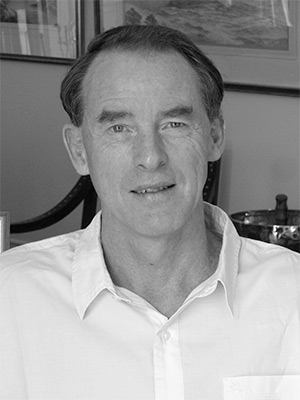 I served for 34 years in the Royal Marines, finishing my time as a General. In consequence of this and other experiences in my life, I have thought long and hard about resilience and have been teaching the subject, including to the NHS, for many years. I thought it might be helpful to summarise some of my thoughts for the benefit of those who must now gird themselves to tackle and to keep society safe from the Coronavirus. Please circulate this as widely as you see fit.
I served for 34 years in the Royal Marines, finishing my time as a General. In consequence of this and other experiences in my life, I have thought long and hard about resilience and have been teaching the subject, including to the NHS, for many years. I thought it might be helpful to summarise some of my thoughts for the benefit of those who must now gird themselves to tackle and to keep society safe from the Coronavirus. Please circulate this as widely as you see fit.
My understanding from a number of hospitals and groups of health care workers, is that there is growing apprehension and anxiety during this period of anticipation. People know that the surge of Coronavirus patients – the 20% with acute symptoms requiring hospitalisation – is coming. But for the moment there is little for some groups of people to do, since their usual roles and functions have been suspended and they have been re-assigned to meet the projected requirement for extra capacity. There is a sense of a ‘Phoney War’. This can generate feelings of impotence, disorientation and disempowerment. A sense of unreality. This huge wave is rolling inexorably toward you. The Media has graphically described what its impact is in Italy and Spain and London, but as yet there is no way of influencing it. The individual’s ‘locus of control’ is compromised.
This period is very similar to that prior to combat, of which I have experience. It is enervating and one’s imagination can start to race. People can become irritable and superstitious. It is sometimes the most stressful part of the whole experience. There is a recovered sense of purpose, reassurance and relief in getting stuck in, actively practicing your craft and working as a team.
That said, there will clearly be severe challenges associated with the impending surge of patients. So called Moral Harm can result when people are repeatedly obliged to make judgements which are fundamentally conflictual and outside their common experience; where they are unable to save many lives – confronting the c 50% who simply die having been intubated/ventilated. Or for a lack of equipment, medicine or staff capacity, having to triage patients and let some die without any intervention. Over time this can render staff ineffective and if stressed for prolonged periods in this manner, can lead to mental illness. It is worth reflecting that with 100,000 hard personnel gaps in the NHS and chronic resource shortages and enduring, so-called Winter Pressures, some 30% of the NHS were assessed as having incipient psychological problems – mainly anxiety and depression – before the immense extra demands posed by the Coronavirus pandemic impacted. At the end of a war or operational tour, troops typically take about two months leave, to recover physically and psychologically from the demands of combat. It is fair to assume that this will not be possible for NHS staff. When the Coronavirus is tamed or defeated, long lines of patients demanding postponed operations and treatments will then appear at the doors of hospitals and GPS. In consequence, the risk of exhaustion and burn out will have to be very carefully managed.
In the Second Gulf War I spent extended periods in what is known as NBC State Black, as our alarms upwind in the desert indicated that Iraq had released chemical weapons. Operating in helmet, rubber mask and gloves and a double layer of thick clothing at 40 C for hours was immensely physically and psychologically stressful. I am aware that the protocols governing PPE seem to change daily, driven by supplies and availability rather than virology, logic and best practice. This fundamentally undermines the confidence of those wearing it, presupposing they have a full suite of PPE to wear Currently health workers operating in ITU put a thick white mask on for four hours beneath their visor. To avoid cross contamination, they then do not touch it for four hours. This means that they cannot eat or drink in this time. They are working beneath impermeable layers in environments/wards, which must be kept warm for those heavily sedated on ventilators and subject to the wild heat generated by all the equipment essential to life support. This is a recipe for dehydration and mental and physical exhaustion on the part of staff, particularly in the longer term and careful thought must be given to how this strain might be mitigated, whatever the PPE shortages.
Professor Neil Greenberg, chair of Military Mental Health at King’s College London was interviewed by Claudia Hammond on R4’s All In The Mind programme on 8 April 2020 at 1530. He is now working at the Florence Nightingale Hospital in the Excel Centre in London, using his experience of the Moral Harm suffered by military personnel obliged to make difficult (morally wrong) decisions in combat to prepare the NHS staff there for the unusual dilemmas they are now likely to confront it. It is worth listening to this c10 minute interview on iPlayer. I attach (below) a Venn Diagram, which shows how Post Traumatic Stress as well as Moral Injury manifest themselves and how they overlap.
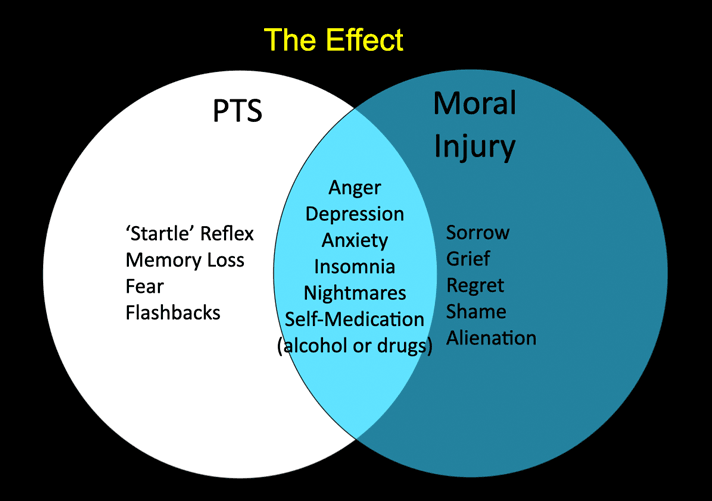
Now is the time for Leaders to discuss these matters with staff; to socialise the idea that ‘you can only do your best’ and under such circumstances the entire British public recognises that the NHS’s current efforts on our behalf are irreproachable and have been likened to those of The Few who fought in the Battle of Britain in 1940. That way a sense of guilt should not accumulate. Importantly, Leaders will be legitimising the conversation, which people will need to return to, often repeatedly. People’s concerns may be insoluble. The important thing is to let them be heard. To tell them that they and the team are doing their very best under really difficult circumstances. Frequent reassurance and praise from those they trust in authority are really important. As the author Primo Levi (survivor of the Concentration Camps) observed, ‘an unusual experience engenders in the average man, the need to talk.’ The Trauma Risk Management (TRiM) approach introduced by the Royal Marines (and subsequently throughout the British Armed Forces) was predicated on encouraging those who had experienced shocking events to discuss and make sense of them through group conversations, as soon after the incident as was practicable, to forestall emotional scarring. Talking things through, in a facilitated manner (the Leaders role) with your mates, gives perspective and relief.
It is for Leaders to take responsibility for the often, poor outcomes of those suffering from acute Coronavirus symptoms, not for the individuals who struggle, but fail to keep patients alive. Leaders must bear this burden. Though at this point it is worth asking, ‘who guards the guardians?’ because Leaders will need psychological support in their task too.
Some, often the inexperienced, but sometimes experienced individuals accustomed to operating in a certain manner, will not manage to function under such unfamiliar, dynamic and immensely stressful circumstances. Particularly if it is enduring and where they are themselves at risk. There must be a policy and protocols for compassionately managing those who are unable to cope; to care for such people without stigma or blame. Where possible to find less pressurised roles for them that they can perform without suffering panic attacks and the like.
My purpose, in past weeks, of sharing off-beat films, writings, poems, and songs with some of you, to in turn share with your staffs (I can provide a list of URL’s/copies of these, for those who wish it) is to enable you to broaden the emotional dialogue and register with your people; to encourage and legitimise greater intimacy and familiarity. It will strengthen the sinews that bind you. In consequence, in such exceptional circumstances, individuals and groups will be more prepared to communicate with you (and each other) in an honest and forthright manner. This will enable dialogue, responsiveness and nimbleness and help Leaders to take timely action to address issues, before they escalate. Symbolism and creativity at such times is powerful. Leaders should be prepared to step beyond their conventional bureaucratic personas; to show more of themselves; their humanity, humour, hinterland, so that they are more tangible, real and relatable. They should also display greater interest and curiosity to understand people’s lives, family circumstances, concerns, hopes and dreams.
The Canadian Psychologist, Eric Berne, described this model of communication to show how rapport and connection is established. For the British Ritual and Cliché equates to discussing the weather or possibly football – conversations that carry no freight or meaning. For Americans it is sport. An overlooked part of communication is clearly LISTENING. This is particularly important for the pressurised Leader whose inclination will be to interrupt. Try to employ your mouth and ears in the ratio in which they were issued to you. Laurie Lee, in an essay on Charm, described ‘the ability to listen without vagueness’ as one of just a dozen key qualities.
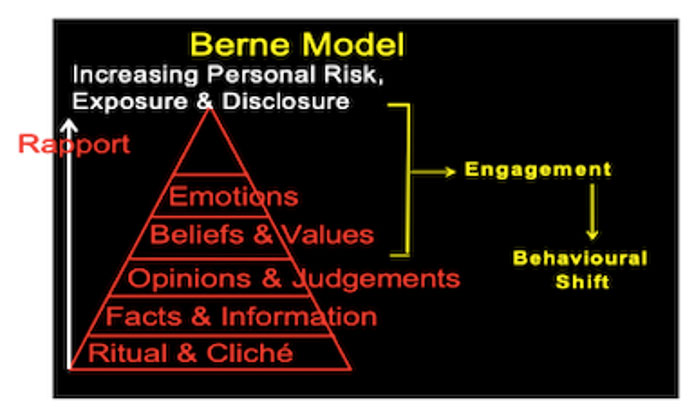
One of the most effective ways to reassure people is through physical contact. When I was a general there were seventeen ranks between me and a Marine rifleman – this could be a difficult gap swiftly to bridge. I would always find some way to physically touch them in order to connect and do so emotionally. Sometimes, on the battlefield (and to their surprise) I would hug them! Such demonstrative behaviour has been constrained in the age and with the sensitivities of #MeToo, and clearly to a much greater degree with the arrival of Coronavirus, but when everyone is in PPE, surely such physical contact is possible. If you are very senior in the hierarchy, how might you imaginatively compensate for this lack of touch? The staff of Jersey Hospital are pinning photocopied pictures of themselves to their PPE, so that their patients should feel less alienated and alone.
I have also noticed that people who are physically distancing themselves (by at least two meters) very often become entirely uncommunicative too. It is as if fear of encouraging proximity constrains them from speaking to each other at all. This should be guarded against. In particular humour should be encouraged – however black; and the crazier the better. Commander Rick Jolly, who commanded the ‘Red and Green Life Machine’ – the Field Hospital, which treated all UK casualties (and many Argentine) during the Falklands War, described its value in ‘allowing people to take sabbatical leave from reality.’
In the most awful of circumstances it enables people still to find Milan Kundera’s Unbearable Lightness of Being. My quite possibly lame nod to this is to quote two jokes listed under ‘Infectious Humour’ in The Sunday Times of 22 Mar ’20:
‘In an unsettling reversal of my teenage years, I am now yelling at my parents for going out.’
Brigid Delaney
‘I managed to get one loo role from Tesco, but I feel bad for the next person to use their customer toilet.’
Mark Simmons
In crisis, the idea of ‘all being in one boat’ is powerful. It is conventional I believe for NHS executives and consultants to wear ‘civilian’ clothes in hospitals. They should now wear the same dress, the same uniform as everyone else, as a clear visible symbol of this. Surely Scrubs are anyway the first line of PPE, designed for hygiene and the boil wash. The argument that there are insufficient to go around is as weak as every other, which justifies an insufficiency of PPE. Executives also owe such a change to their families. Rather than travelling back and forth from home to hospital in potentially contaminated civilian clothes, they should (as many are endeavoring to do through social distancing) add this further ‘airlock’ and change into and out of Scrubs at work and shower before leaving work. Their civilian clothes should also be as simple as possible, to enable regular hot washing at home.
The hinge factor in all of this is TRUST (paradoxically both the glue and the lubricant of life). This can be defined in the following manner:
TRUST = Credibility + Reliability + Intimacy
——————————————–
Perceptions of Self Interest
Where:
Credibility equates to competence, professional/technical ability and proficiency. Can you ‘walk the walk’, deliver, and do what you say you’ll do?
Reliability equates to do you do what you say you’ll do? Are you as good as your word? ALWAYS. The ability to remain calm and rational in times of crisis is particularly important.
Intimacy equates to are you visible; seen to be believed; present, engaged, caring? In an environment like that of this pandemic, involving physical and psychological risk, it is important that Leaders do and are seen to share the risk. There has never been any credibility in ‘chateau generalship’.
Perceptions of Self Interest: this is the great detractor; you MUST be selfless in your service to the cause and the greater good. This is not about you, your career, or personal advantage. That said, you also need to look after yourself, eat properly and sleep. There is no merit in becoming exhausted and incapable or a casualty of Coronavirus yourself.
It is easier to be courageous and steady when working in a group with those you trust. Fear more easily stalks those who are isolated. Teams are always stronger. As Kipling put it:
‘For this is the truth of the wolf pack, Its strength runs forward and back,
For the strength of the pack is the wolf, And the strength of the wolf is the pack.’
Think carefully how individuals are moved around hospitals in the interests of flexibility and need. Understand what the minimum primary group or unit is. In the military this is either four or eight people. Personnel are reassigned or task organised in these groups, not split out of them as individuals. That way, they continue to work alongside those they know and trust. This reduces anxiety and preserves bonds of identity and understanding. The careless fracturing of primary groups should be avoided.
The following diagram analyses why the entire French Army mutinied in the trenches of the First World War in 1917. This equates to the Yang. The factors which led cohesion and morale to unravel are universally applicable – after all, people are people. The concentric rings show the stages through which well-being degenerates. The arrows show the factors which can trigger this decline. Their origin and point indicate how they might impact, and their size, the likely scale of their influence. My analysis suggests that inspirational Leadership can have a profound and unique effect in preventing such problems. As Nietzsche observed ‘With a Why people can deal with any How’. The diagram might be used as a check list ensuring vigilance against the things that might undermine individuals and the team. ‘Disproportionality’ in terms of Ends, Ways & Means, clearly speaks to inadequacy of supply of PPE.
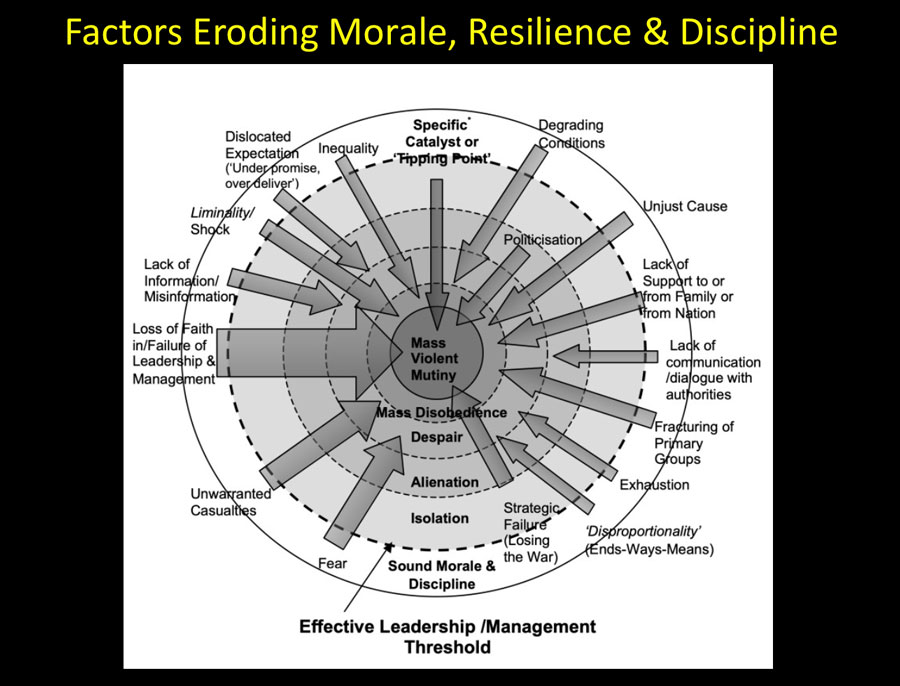
The Yin can be described through the tenets of Positive Psychology as espoused by Martin Seligman:
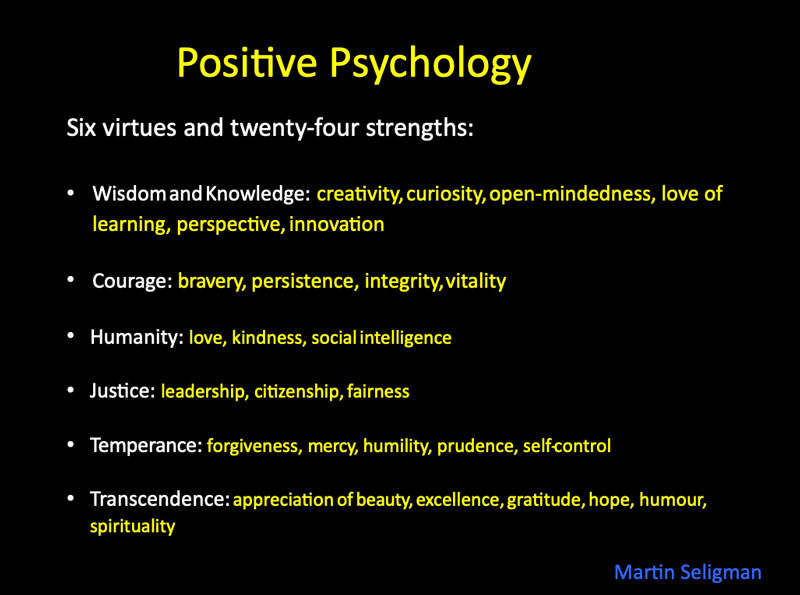
The Mythologist Joseph Campbell, drawing on The Odyssey and Arthurian Legend defined a model for considering the tests and trials of life. It is circular and the temporal aspect of the journey around this circle is entirely flexible. It may happen in a day or a lifetime or for the duration of the Coronavirus pandemic. It is a powerful handrail – a way of looking and making sense of what is and will be a huge challenge.
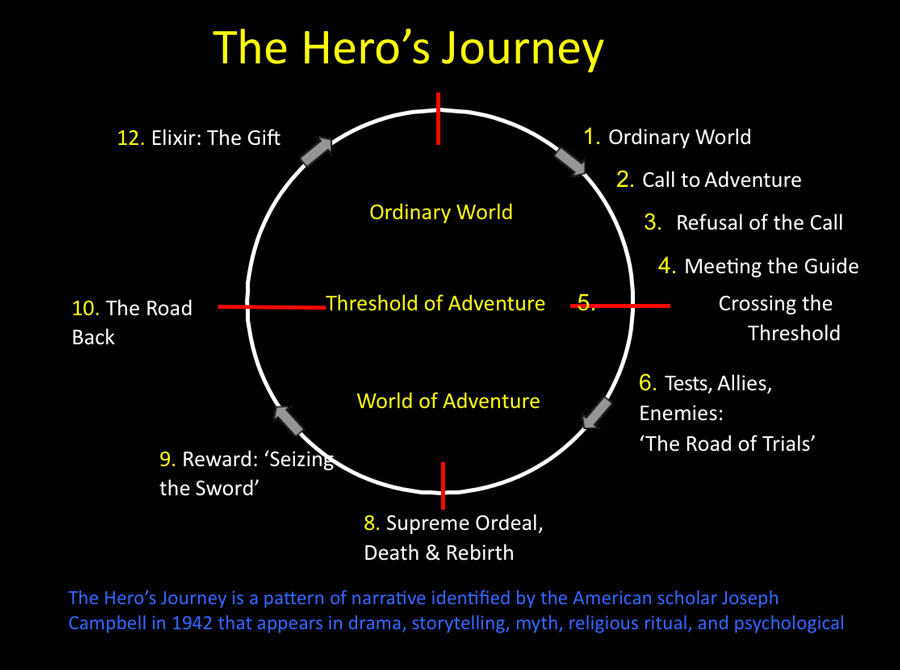
Notes:
- This model describes the classic narrative arc of a heroic story, but also of the trials of life (heroic or otherwise). A way of understanding the cyclic nature of motivation, action, inaction and change.
Effect change through the first-person narrative. - It is quite as much a SHEro’s journey!
- Call to adventure: point where our freedom and destiny merge: ‘Here I stand I can do no other.’ MLK
- Refusal of the call: wrestle perhaps for years with fear and denial before being able to transcend that fear; being able to progress. The waste land of the inauthentic life. In the face of refusal, we continue to be restless and dissatisfied.
- Guide: sometimes a guide is needed to lead us out into the unknown.
- We deny our destiny because we lack the courage to risk what we have. In the face of refusal, we continue to wonder and be restless.
- ‘Whatever you can do, or dream you can do, begin it. Boldness has genius, power and magic in it.’ (Goethe)
- Crossing the threshold: Pass into a domain without maps a void, the perilous journey begins of tests, trials and ordeals; a place of terror and opportunity.
- Elixir: The Gift: you will return perhaps to a different home, changed from the person who set out. Wiser, stronger, calmer.
- … different way of thinking, what Bruner calls the ‘narrative mode’ – [evolving a story line with ideas that made intuitive sense within it.] The narrative mode is a mythic mode. It contains another dimension, not usually contained in paradigmatic (linear, logical) thinking – the dimension of good and evil, sacred and profane. The mythic mode helps people not only tell a story, but to make sense of the emotions and moral sensations aroused by the story.
- Dan P McManus argues that children develop a narrative tone, which influences their stories for the rest of their lives. Children gradually adopt an enduring assumption that everything will turn out well or badly (depending on their childhood). They lay down a foundation of stories in which goals are achieved, hurts healed, peace is restored, and the world is understood.Alternatively, this for some may be a more useful model:
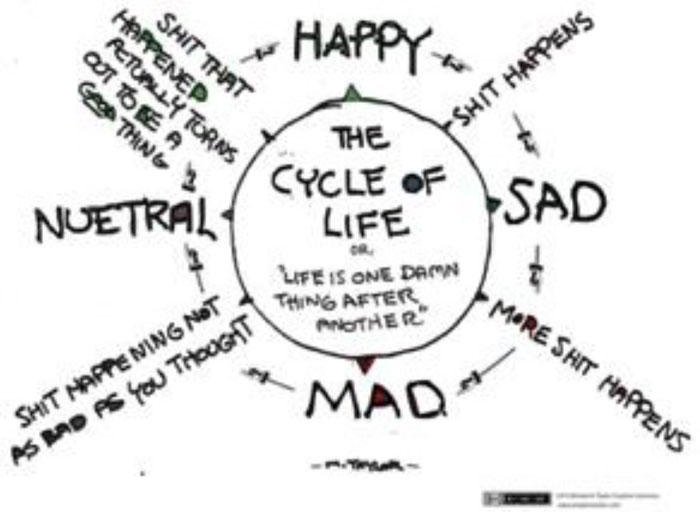
It may seem somewhat perverse to think in terms of Gifts in the context of this awful thing, but nevertheless I believe there are several: 1) the priceless one that through your endeavours you confer on the vast majority of your patients, that of continued life; 2) a much greater public awareness of and value placed on what you all do – the NHS will be better resourced in future; 3) war is the mid-wife of change and your hospitals and the NHS as an institution, will be evolving and adapting for the better, and at a speed and with a suppleness, which would be impossible under normal bureaucratic circumstances; 4) and finally, you will emerge from this trial by fire with an immense sense of achievement and pride. The friendships forged in combat are unlike almost any other. ‘The brotherhood and sisterhood of the shared ordeal and ideal.’ Those created in the furnace of the Coronavirus pandemic will then last for a lifetime. In the years to come, you will quietly wear an immense badge of honour and you will smile at one another and KNOW. What most people want in life is a sense of identity, purpose and belonging. You will have acquired all three by the bucket load.
I hope these notes may be of some general value to those who confront this enormous challenge, wherever they might work in the NHS or indeed more widely, and whether they lead large numbers or simply themselves.
If you wish to contact me, my e-mail address is busterhowes@hotmail.co.uk
There is a recording on YouTube, of a 90-minute talk I gave on Resilience at Exeter’s RD&E Hospital, last December, which incorporates some of these thoughts and many others, see below or link:
I wish you all, with the greatest of admiration, strength and courage in the days and weeks ahead.

12 April 2020


